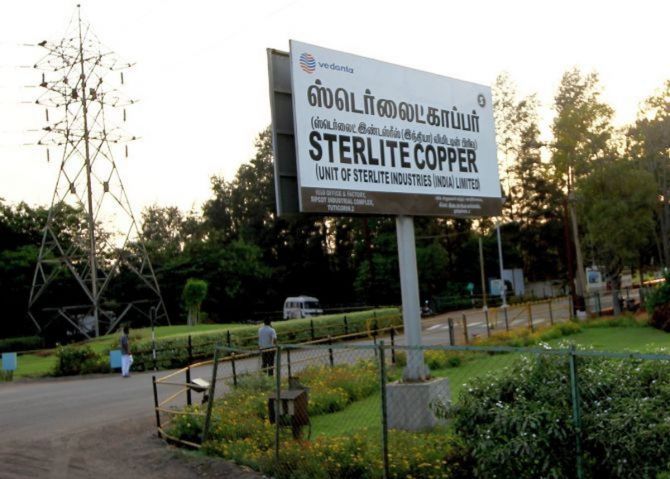The Madras high court on Tuesday rejected a plea from mining giant Vedanta for allowing reopening of its Sterlite copper unit at Tuticorin in Tamil Nadu, which has been closed since May 2018 over pollution concerns.

Accepting the state pollution control board's stand that the firm's operations were behind pollution, the court said safeguarding the environment received primacy and economic considerations could have no role to play in such matters.
The company described the verdict as "temporary setback" and said it would look into all legal options available to it, while political leaders and others welcomed the judgement.
A division bench of Justices T S Sivagnanam and V Bhavani Subbaroyan upheld the orders of the Tamil Nadu Pollution Control Board, directing closure of the unit in May 2018.
It had on January 9 this year reserved orders on the matter.
The court, in its 815-page judgement, dismissed a batch of writ petitions from Vedanta and others challenging closure of the unit, which was at the centre of massive violent protests over pollution concerns.
"We are inclined to accept the stand taken by the TNPCB to hold that the increase in the levels of TDS, chloride, sulphate and total hardness are all attributable to the petitioner's operation and therefore the order of closure cannot be stated to be on account of speculation," the verdict said.
Also, the past conduct of the petitioner is consistent with the conclusion that they have not complied with mandatory rules and regulations and only attempted compliance under the threat of judicial orders of closure or intervention.
Hence the firm "cannot be allowed to run a highly polluting red category industry, when the petitioner is oblivious to ecological sensitivities, especially after having polluted the area substantially over the past 22 years of its operation," the court said.
The shocking reality is that for the substantial period of the time from 1995 till 2018, the petitioner was operating without valid consent to operate.
They were operating either on account of orders passed by courts/tribunal or by stating that application for renewal of consent was pending.
Rejecting Sterlite's argument that if their plant was shut, the requirement of copper in India cannot be met, and that it would be a great blow on the economy, the court said when the economy was pitted against the environment, only the latter aspect received primacy.
"Therefore, economic considerations can have no role to play while deciding the sustainability of a highly polluting industry and the only consideration would be with regard to safeguarding the environment for posterity and remedying the damage caused."
On Sterlite Copper's stand that local people wanted the plant to continue, the court said such submissions deserved outright rejection as it pointed to the compilation filed by TNPCB contianing details of complaints against the petitioner not only from the public, but also political parties and MLAs.
"As per the report of the Government of India - National Clean Air Programme dated January 10, 2019, giving a list of most polluted cities in the Country, in Tamil Nadu, Thoothukudi (Tuticorin) is the only District which finds place in the list of most polluted city in Tamil Nadu."
These statistics revealed by the Government of India clearly showed that the averment made by the petitioner that Tuticorin is safer than Chennai is to be rejected as being unsubstantiated.
The court said it was of the clear view that the petitioner has not been able to establish that the impugned decisions were malafide or on account of extraneous or political considerations.
Also, the impugned orders cannot be said to be devoid of reasons, as the Government Order, while endorsing the closure order of the Pollution Control Board, directs permanent closure and sealing of the unit and has referred to the mandate cast on the State by the Constitution and bearing in mind the larger public interest.
The court traced the prolonged litigations involving the company since its inception and quoted several Supreme Court judgements throughout the verdict.
Vedanta had approached the high court in February 2019, seeking to reopen the Sterlite plant which was closed following a May 23, 2018 order issued by the TNPCB in the backdrop of violent protests against the unit which left 13 people dead in police firing on May 21 and 22.
It had filed the petition in the high court as suggested by the Supreme Court, which had on February 18, 2019 set aside the National Green Tribunal order that allowed opening of the Sterlite Plant.
Several people hailed the high court judgment in Tuticorin in southern Tamil Nadu by distributing sweets and bursting fire crackers.
Deputy chief minister O Panneerselvam welcomed the ruling, saying it reflected the thoughts of crores of people.
Dravida Munnetra Kazhagam president M K Stalin said he bowed before the court for its judgement.
He urged the government to pass a Cabinet resolution welcoming the judgment and file a caveat petition in the Supreme Court in case Vedanta files an appeal.
Marumalarchi Dravida Munnetra Kazhagam chief Vaiko said the judgement has done justice and hailed it as "a huge win" for people's agitations.
"Without compromising even a little, I myself have argued against the plant before the tribunal, the high court and the Supreme Court," he said and recalled his party's "26-year-long struggle against the plant.
State secretaries of Communist Party of India-Marxist and CPI, K Balakrishnan and R Mutharasan, Pattali Makkal Katchi founder leader S Ramadoss also urged the government to fight the matter in the apex court if the firm went on an appeal and ensure the plant's permanent closure.
Sterlite CEO Pankaj Kumar told reporters in Tuticorin, "We will look at all legal options available to us."
Associate Vice President D Dhanavel said the judgement was "disappointing" and a "temporary setback."
To a question, Kumar said: "There may be a possibility of lay-off," adding the plant has been shut for over two years.
Dhanavel said "our company has continuously taken efforts to protect jobs of all to the possible extent, despite closure. But now with this setback, that (safeguarding jobs) will be a challenge...we will discuss this and take further steps considering the welfare of employees."
In its arguments during the hearing, Vedanta had claimed that the closure order was nothing but 'naked discrimination' against the company and a knee-jerk reaction of the state to 'appease' a section of public with vested interest after 13 protesters were killed in the police firing.
Rejecting the charges, the state government had submitted that it has full authority and powers to shut down a factory when it causes a serious threat to the environment and ecology.
The Sterlite unit had flouted many rules, which amounted to violation of statutory provisions, warranting closure of the factory, it had told the court.











 © 2025
© 2025